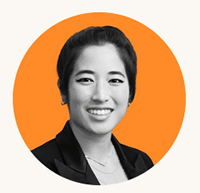"I often forget to stop to appreciate achievements along the way"
Nako Nakatsuka, a Principal Investigator at the Laboratory of Biosensors and Bioelectronics (LBB), was named one of this year’s Innovators Under 35 by MIT Technology Review. In an interview Nako talks about her research and her commitment to different diversity initiatives at ETH Zurich.
Nako, you were named one of this year’s Innovators Under 35 by MIT Technology Review, congratulations! What does this nomination mean to you?

Thank you very much! I am very humbled by the nomination and grateful for the recognition. I often get caught up in my academic bubble of pushing for publications, grants, and the next research challenge that I forget to stop to appreciate achievements along the way. I always feel behind and that I am not doing enough. After MIT announced the Innovators List, I received messages from individuals regarding their experience with depression or other brain-related diseases. Reading such messages re-inspired and encouraged me, that despite the daily challenges, the work I do is important.
The aim of your research is to discover the fundamental functions of the human brain to advance the limited understanding of certain diseases. How did you get into this field of research and what is your main focus?
I got into this research field by chance. I did research in tissue engineering in my Bachelor’s, which I loved because the idea of regenerating ligaments post-injury was relatable for me. When searching for a PhD group at UCLA (University of California, Los Angeles), I was inspired by the vision of my supervisor, Anne Andrews, who wanted to measure serotonin in the brain to understand how this neurotransmitter regulates anxiety and depression. Being co-supervised by Paul Weiss, I also had the unique opportunity of tackling these neuroscience questions from a chemistry and engineering angle. The brain communicates through both chemical and electrical pathways, but we currently lack tools that enable neurochemical sensing in complex environments. So, my main focus is tackling the challenges of chemical biosensing and developing technologies that interface neurochemical detection with existing electrical platforms to enable a comprehensive investigation of healthy versus diseased brain states.
You are also very active in the diversity and inclusion team at D-ITET (D+ITET) and co-organizer of the AVETH Diversity Award which was presented for the first time in May 2021 by the Association of Scientific Staff at ETH (AVETH) and Equal! What drives you to get so committed in this area?
Last summer, I witnessed global movements to tackle racism and discrimination, which gave me the opportunity to reflect on my own privilege. While I have experienced discrimination in my life, I am now at a world-leading institution like ETH that supports me as a female scientist. Acknowledging my privilege drove me to think of what I can do to advocate for and amplify the voices of those who do not have the same platform as me. I feel a great sense of responsibility to promote diversity and inclusion in the workplace. I try to initiate difficult conversations regarding discrimination because such dialogue is necessary here in Switzerland. However, since these discussions are new and often stigmatizing, we must first raise awareness through awards such as the AVETH Diversity Award that signifies that diversity is a core ETH value. Of course, such awards are just a start, and we need to keep driving actionable initiatives at the institutional level to truly change the culture at ETH.
How do you feel as a chemist by training at the Department of Information Technology and Electrical Engineering?
I never thought I would end up in an electrical engineering department as a chemist, but I really love it! My group (Laboratory of Biosensors and Bioelectronics, LBB) is diverse in expertise and my colleagues are very collaborative. I can learn so much from LBB members like coding and electronics, and in turn I can contribute my chemistry knowledge to many different projects. I truly believe innovation that solves real problems is driven by collaboration and the bridging of different disciplines. Without teamwork, none of my technological visions would have been possible. I am very grateful to Janos Vörös, who leads the LBB, for seeing potential in my vision and giving me the opportunity to come to ETH to realize transformative technologies for neuroscience.